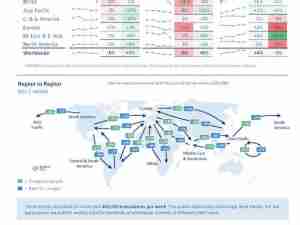United Sinks After $400 Million Hit From Weaker Airfares, Harvey
By: | Sep 06 2017 at 12:11 PM | Air Cargo
United Continental Holdings Inc. tumbled the most in seven weeks as it vowed to keep discounting some fares even as an expanding price war and the impact of Hurricane Harvey undermined quarterly sales by $400 million.
The third-largest U.S. carrier will continue battling low-cost carriers with cheap tickets at its major hubs despite the short-term pain, Chief Financial Officer Andrew Levy said Wednesday at an investor conference. The clash is adding to pressure from weak pricing on trans-Pacific flights and a rocky start for new no-frills fares, which also contributed to the blow to quarterly revenue.
“We don’t like where the fare structure is right now,” Levy said at the Cowen & Co. event in Boston. “It is painful, difficult but we’re going to see it through.”
The multiple financial blows prompted United to chop its third-quarter forecast for revenue from each seat flown a mile, a benchmark gauge of airline pricing power. The measure is now expected to fall 3 percent to 5 percent, United said. The company previously said it would fall no more than 1 percent and could even rise as much as 1 percent.
United fell 2.2 percent to $59.77 at 11:35 a.m. in New York after dropping as much as 5.5 percent for its biggest intraday slide since July 19. That was the largest fall on a Standard & Poor’s index of five U.S. airlines, which in aggregate climbed less than 1 percent.
‘Competitive Pricing’
United wasn’t the only carrier lowering its outlook for the quarter. Southwest Airlines Co. said revenue for each seat flown a mile, or unit revenue, will be down 1 percent to “slightly up,” Chief Financial Officer Tammy Romo said. The previous forecast called for a gain of 1 percent. She said the change was largely due to the “current competitive pricing environment.”
Harvey will reduce third-quarter revenue by $40 million to $60 million, Romo said, citing Southwest’s initial estimates.
American Airlines Group Inc. didn’t update its guidance for third-quarter unit revenue or capacity, saying it would stick with an earlier plan to do so next week. A new and powerful hurricane, Irma is likely to hit Florida, where American has a major hub in Miami.
“We’re on track with our guidance, but obviously there’s a lot of uncertainty facing us in September with Irma,” said Don Casey, American’s senior vice president of revenue management.
Hurricane Impact
At United, Harvey sparked the “largest operational impact in the company’s history,” Levy said, with more than 7,400 flights canceled over four days. The storm forced United to cut its outlook for unit revenue by 1.5 percentage points and was the single-biggest cause of the forecast reduction.
“We had to just walk away from a large amount of revenue during what is an important part of the year for us,” Levy said.
Adding to United’s woes, the airline underestimated the loss of market share from its new “basic economy” tickets, Levy said. While some customers chose to buy pricier seats after seeing the no-frills fares, that extra revenue was offset by customers shifting to competitors.
The carrier is continuing to match some cheap fares in its hub markets to push back against Spirit Airlines Inc. and other low-cost rivals. Spirit told investors at the Cowen conference that discounting by competitors has spread around its U.S. network and now affects about half its revenue base.
